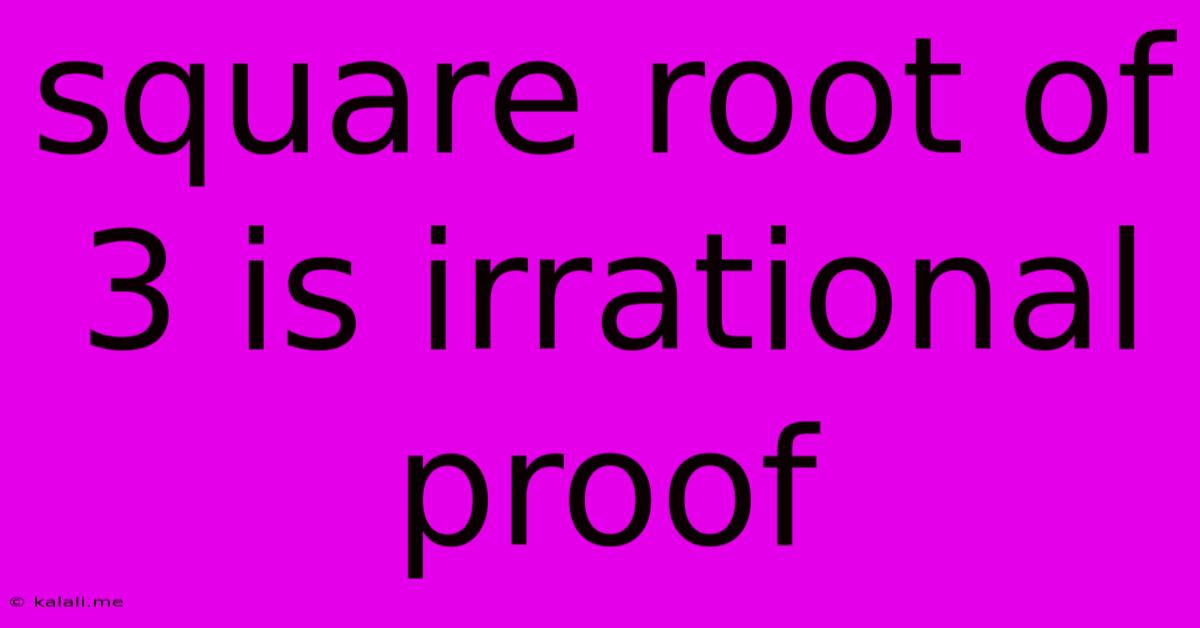Square Root Of 3 Is Irrational Proof
Kalali
May 23, 2025 · 3 min read

Table of Contents
Proving the Irrationality of the Square Root of 3: A Comprehensive Guide
The square root of 3, denoted as √3, is an irrational number. This means it cannot be expressed as a fraction p/q, where p and q are integers and q is not zero. Understanding why this is true is fundamental to grasping number theory concepts. This article presents a clear and concise proof using the method of contradiction, a common technique in mathematical proofs. We'll break down the proof step-by-step, making it accessible even to those without a strong mathematical background.
Understanding the Concept of Irrational Numbers
Before diving into the proof, let's briefly recap what irrational numbers are. Rational numbers can be expressed as a ratio of two integers (a fraction). Irrational numbers, on the other hand, cannot be expressed in this way. Their decimal representation is non-terminating and non-repeating. Famous examples include π (pi) and e (Euler's number), in addition to the square root of many non-perfect squares, like √3.
Proof by Contradiction: The Square Root of 3
We'll use proof by contradiction to demonstrate the irrationality of √3. This method assumes the opposite of what we want to prove and then shows that this assumption leads to a contradiction, thereby proving the original statement.
-
Assumption: Let's assume, for the sake of contradiction, that √3 is rational. This means it can be expressed as a fraction p/q, where p and q are integers, q ≠ 0, and p and q are coprime (meaning they share no common factors other than 1). This is crucial for our later argument.
-
Squaring Both Sides: If √3 = p/q, then squaring both sides gives us: 3 = p²/q²
-
Rearranging the Equation: We can rearrange this equation to: 3q² = p²
-
Deduction about p: This equation tells us that p² is a multiple of 3. Since 3 is a prime number, this implies that p itself must also be a multiple of 3. We can express this as p = 3k, where k is another integer.
-
Substituting and Simplifying: Now, substitute p = 3k back into the equation 3q² = p²:
3q² = (3k)² 3q² = 9k² q² = 3k²
-
Deduction about q: This equation shows that q² is also a multiple of 3, and therefore, q must be a multiple of 3 as well.
-
The Contradiction: We've now shown that both p and q are multiples of 3. This contradicts our initial assumption that p and q are coprime (they share no common factors other than 1).
-
Conclusion: Since our initial assumption leads to a contradiction, the assumption must be false. Therefore, √3 cannot be expressed as a fraction p/q, and it is irrational.
Expanding on the Proof's Significance
This proof highlights the elegance and power of proof by contradiction. It's a fundamental technique used throughout mathematics to establish the truth of many important theorems. The proof also demonstrates the inherent properties of prime numbers and their role in understanding the nature of rational and irrational numbers. The concept of coprime numbers is also crucial for this specific demonstration. Understanding this proof deepens your understanding of number theory and the intricacies of the real number system. It's a cornerstone concept in advanced mathematical studies.
Latest Posts
Latest Posts
-
How Do I Say In English
May 24, 2025
-
What Is The Major Reason That Atoms Join Together
May 24, 2025
-
I Will Have War With Amalek
May 24, 2025
-
On Your Mark Get Set Go
May 24, 2025
-
How Do You Get Gas Smell Off Hands
May 24, 2025
Related Post
Thank you for visiting our website which covers about Square Root Of 3 Is Irrational Proof . We hope the information provided has been useful to you. Feel free to contact us if you have any questions or need further assistance. See you next time and don't miss to bookmark.